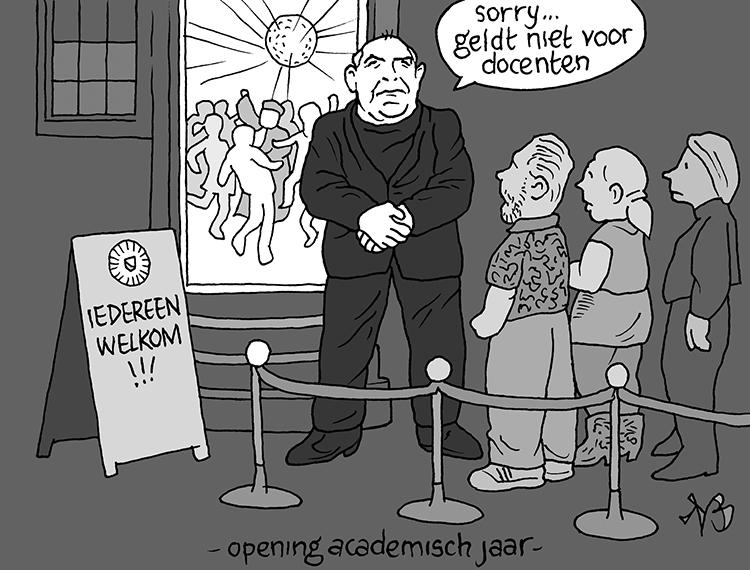That is the question
Should teachers without research duties get permanent contracts?

What is going on?
The University Council wants UU to give permanent contracts to some of its 430 temporary lecturers. Many courses are taught by temporary lecturers, especially in the faculties of Social Sciences and Humanities. They compensate for fluctuations in student numbers, cover for staff when they are sick, and replace scientists who ‘buy’ themselves out of teaching with research grants. They form the ‘flexible shell’ of the organisation, as the university officially calls it.
However, according to the council, in practice, temporary lecturers are performing structural tasks even though they are only given contracts lasting up to four years. And that leads to several problems. New temporary teachers have little time to familiarise themselves with their new jobs, and they usually have a lot of work to do without the prospect of a permanent position. Last year, the council wrote a memo to the Executive Board stating that this is inefficient and incompatible with UU's desire to be a good employer (memo only accessible to people with a Solis ID, Ed.). Besides, the high turnover is bad for the continuity and quality of education. Having to continuously recruit and supervise new teachers also increases the workload for permanent teachers.
But that's not all: this way of working costs a lot of money too. The councillors have calculated that having 65 temporary teachers join the Faculty of Social Sciences every year leads to one million euros in training and supervision costs yearly.

'Everyone is welcome,' says the sign, but the bouncer says the rule does not apply for teachers without research duties. Cartoon by Niels Bongers
Why doesn't UU give these hard workers a permanent contract?
The Executive Board does not want to give permanent contracts to employees who only teach and don't do research. The term 'lecturer' is used for staff members in this situation, although university policy states that permanent contracts are reserved for assistant professors, a term whose Dutch equivalent contains the same word for 'lecturer'. Associate professors are employees with a PhD who conduct research in addition to teaching lectures and seminars.
Replying to the University Council (page available only to users with a Solis ID, Ed.), the Executive Board argues that the principle of ‘bipolarity’ is in the best interest of students as it means that students will have teachers who are up to date with the latest scientific research and who can incorporate that knowledge into their teaching. Other Dutch universities are less rigid in this regard.
UU's Executive Board says it would rather tackle the workload issue by increasing the number of associate professors instead. According to the board, the success of this policy is evidenced by the increase in the number of permanent academic appointments at UU and figures that show that only 22.9 percent of teaching staff in Utrecht are lecturers only. That's far below the national average of 36.4 percent.
The university can only make an exception for practical lecturers who teach specific clinical or legal skills in addition to a job outside UU, who can be given a permanent appointment for a small number of hours.
What do the members of the University Council think of that answer?
In a discussion held last week, council members argued that this is not enough. According to them, the increased number of assistant professors has hardly reduced work pressure at UU. In addition, the vacancy freeze currently in place in many faculties prevents new permanent appointments, and there is virtually no money for research time.
Above all, the council members feel that the Executive Board is fooling itself and the university community because, in reality, many Bachelor's students at UU are mainly taught by temporary teachers. The link with research is guaranteed by the course coordinator, who is usually a permanent employee.
For these reasons, the University Council believes this ‘dual role’ can be adequately fulfilled at the team level. Professors and senior lecturers who have research duties can then work together with lecturers who will fully concentrate on teaching. That's how research and education would be combined.
Was the Executive Board convinced?
No. This is not the first time that the board has been confronted with this question, and trade unions have been in favour of permanent contracts for teachers performing structural tasks for quite some time. However, Utrecht University insists on the value of combining education and research at the individual level.
Nevertheless, former rector Henk Kummeling felt addressed in his last council debate. If the situation at the Bachelor's level is indeed as the council members describe it, then he feels there is a gap between the university's strategy and what happens on the work floor. After all, all university policy documents state that professors and associate professors must be visible to students from the start. This means they should teach first-year courses too.
According to Kummeling, the university did not intend for scientists to ‘buy themselves out’ of education with the help of research grants. If these successful scientists are indeed shunning education at the Bachelor's level, Kummeling feels that the Executive Board should have a good talk with the deans responsible for the concerned departments. ‘With all due respect to all the talented temporary teachers, our educational capacity is greater than we often think.’
What do the council members think about this?
They welcomed the prospect of a discussion at the highest administrative level, but they also warned Kummeling that everyone agrees that more scientists should get involved with first-year teaching at the Bachelor's level. This has been said for years. However, despite all the promises and goodwill, it still happens far too rarely.
Meanwhile, according to the council, many temporary lecturers continue to form the engine of Bachelor's programmes, which does not correspond with the ‘flexible shell’ stated on paper. In their view, the Executive Board must face that fact, which is why their demand for permanent appointments for lecturers fulfilling essential educational roles still stands – partly because such a change could help reduce the workload and cut costs.
According to the council members, their proposal is broadly supported, including by faculty administrators. For this reason, they are looking forward to the talks between the Executive Board and the deans.